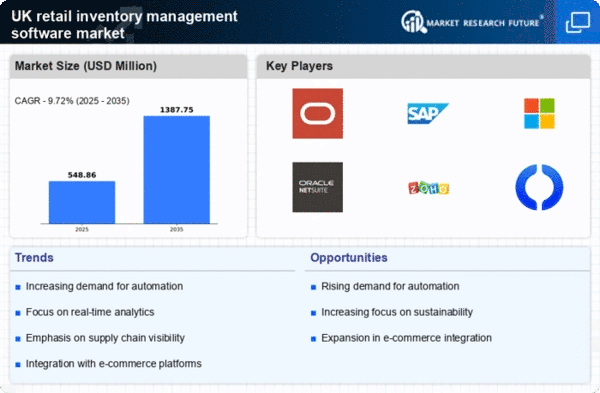Regulatory Compliance and Standards
The retail inventory management software market is increasingly influenced by regulatory compliance and standards. Retailers are required to adhere to various regulations concerning inventory tracking, reporting, and product safety. This has led to a heightened demand for inventory management solutions that facilitate compliance with these regulations. Approximately 50% of UK retailers are investing in software that ensures adherence to industry standards and regulatory requirements. This trend indicates that compliance is becoming a critical driver for the adoption of sophisticated inventory management solutions, as retailers seek to avoid penalties and maintain consumer trust.
Increased Focus on Omnichannel Retailing
The retail inventory-management-software market is significantly influenced by the increasing focus on omnichannel retailing. Retailers are striving to create seamless shopping experiences across various channels, including online, in-store, and mobile platforms. This necessitates sophisticated inventory management solutions that can integrate and synchronise stock levels across all channels. Recent statistics suggest that over 60% of UK retailers are investing in inventory management software that supports omnichannel strategies. This trend highlights the necessity for retailers to adapt their inventory practices to meet evolving consumer expectations and enhance overall operational efficiency.
Rising Demand for Real-Time Data Analytics
The retail inventory management software market is experiencing a notable surge in demand for real-time data analytics. Retailers are increasingly seeking solutions that provide immediate insights into inventory levels, sales trends, and customer preferences. This shift is driven by the need for enhanced decision-making capabilities, allowing businesses to respond swiftly to market changes. According to recent data, approximately 70% of retailers in the UK are prioritising real-time analytics to optimise their inventory management processes. This trend indicates a growing recognition of the importance of data-driven strategies in maintaining competitive advantage within the retail sector.
Growing Importance of Supply Chain Visibility
The retail inventory management software market is being propelled by the growing importance of supply chain visibility. Retailers are increasingly recognising the need for comprehensive visibility into their supply chains to mitigate risks and enhance operational efficiency. This trend is particularly relevant in the context of fluctuating consumer demand and global supply chain disruptions. Approximately 65% of UK retailers are now prioritising solutions that offer enhanced visibility into their inventory and supply chain processes. This shift underscores the critical role that effective inventory management plays in ensuring product availability and customer satisfaction.
Technological Advancements in Inventory Management
The retail inventory management software market is witnessing a wave of technological advancements that are reshaping inventory management practices. Innovations such as RFID technology, IoT integration, and advanced forecasting algorithms are enabling retailers to optimise their inventory levels and reduce costs. Recent data indicates that around 55% of UK retailers are adopting these advanced technologies to enhance their inventory management capabilities. This trend suggests a growing recognition of the potential for technology to drive efficiency and accuracy in inventory management, ultimately leading to improved profitability.
















